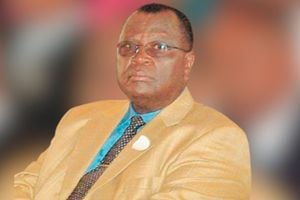
Richard John Veevers (right) and his brother Philip Veevers (left) listen attentively during the inquest into the death of their father Harry Roy Veevers at the Mombasa Law Courts on May 4, 2017.
The body of British tycoon Harry Roy Veevers, who died 10 years ago, may continue to be kept at the Coast General Teaching and Referral Hospital (CGTRH) morgue in Mombasa for more days despite the conclusion of the inquest into his death.
Roy died suddenly on February 14, 2013 at his home in Nyali, where he lived with his British wife, Azra Parveen Din.
He had moved to Kenya after divorcing his first wife, Florence Marvis, in England.
Following his death, his body was exhumed from a Muslim cemetery in Mombasa after being buried for 11 months. The exhumation came after his two sons – Richard John and Philip Veevers – raised concerns about the cause of his death.
The circumstances of his death caused a rift between his two sons and their half-sisters – Alexandra and Hellen Veevers.

Alexandra Veevers at Mombasa Law Courts on May 3, 2017 during the inquest into the death of her father Harry Veevers.
The sons accused their half-sisters and their mother of poisoning their father, claiming that his life was ended prematurely to secure his $7 million (Sh1.12 billion) fortune and to prevent him from marrying a third wife.
The sisters, on the other hand, maintained that their father died of natural causes and denied any allegations of foul play or their mother's involvement in his sudden death.
The dispute over who was responsible for his death led to a 10-year inquest, which ultimately failed to produce solid evidence of criminal responsibility for his death.
With the inquest now closed, the 64-year-old's body may remain in the mortuary for some time.
Richard has expressed an interest in having his father's body repatriated to the UK for a Christian burial.

Richard John Veevers, the eldest son of the late Briton Harry Roy Veevers who died mysteriously at his residence in Mombasa in 2013 testifies at the Mombasa Law Court during an inquest into his fathers death on November 28, 2016.
However, according to his lawyer Kinyua Kamundi, a legal process would be required before the body could be removed from the mortuary for burial in the UK.
"Richard did not take the body to the mortuary, it was exhumed and preserved pursuant to a court order issued by a magistrate in 2014. So he can’t simply walk into the mortuary and pick the body," said Kinyua.
The order issued at the time stipulated that the body should be exhumed for post-mortem and then preserved at the morgue until the inquest was concluded.
"When Principal Magistrate Charles Ndegwa delivered the ruling last December, he did not address the question of what should happen to the body," he adds.
In his ruling, Magistrate Ndegwa had concluded that no concrete evidence had been presented to show that anyone was criminally responsible for the death of the deceased.
He therefore ordered that the inquest file be closed.
The ruling did not clarify what was to be done with the body, which was still in the mortuary, or who was to collect it for reburial and where. It only ordered that the inquest file be closed.
Kinyua said he and his clients wanted to handle the pending matter carefully through legal channels to avoid any accusations of interference.
“We would like to maintain the integrity of the chain of custody of the body at the morgue so that when it gets to the UK, nobody can accuse anyone of tampering with the body or planting anything on it,” he said.
The lawyer reiterated that all interested parties, including Richard's half-sisters, would have the opportunity to either support or challenge the release of the body for transport to the UK for reburial.
"We hope the court will make a decision within one or two weeks. The judge will consider all parties before making a decision, although there are circumstances where a decision may be made without hearing from everyone. We will have to wait and see," Kinyua said.
If the opposing party decides to challenge the application, the deceased's body could remain in the mortuary for several more months, pending a possible escalation of the case to the Court of Appeal.
Richard and his family believe that the previous burial in Mombasa did not do justice to his father and they also intend to appeal the magistrate's ruling.
The foreigner adds that influential people in the UK are interested in having the body returned to the UK for medical procedures and reburial.
“I had promised my mother that I would transport the body to the UK for proper burial. My father must be buried as a Christian and in a proper manner, not the way his remains were hurriedly interred as a Muslim here in Mombasa,” he said in an interview with the Nation.
Kinyua has indicated that the deceased's sons intend to approach the High Court to overturn Magistrate Ndegwa's ruling.
They described the verdict as an embarrassment to the Kenyan legal system.
“We intend to ask that Mr Ndegwa’s ruling be set aside and the inquest be reopened. We do not want to take the body and then later on there are questions of what happened to the body and who picked it from the morgue,” he said.
Richard said the inquest process has been agonising and very disappointing.
“I was informed by a Kenyan friend at the beginning of this process that an inquest in Kenya is a way to get away with murder. To be honest, the process has been very disruptive and painful. The way it has gone shows a complete failure of the system,” he said.
“How can a man be kept in a morgue 10 years after he has died? It just seems impossible. If anybody asks me about my story, I will not tell them, because it is unbelievable. Even me I (sic) don’t want to believe it myself. It is hard to describe what this process has done to us and how inhumane it has been.”
Richard expressed his dismay at the length of the inquest and the speedy and somewhat cursory nature of the court's final decision.











